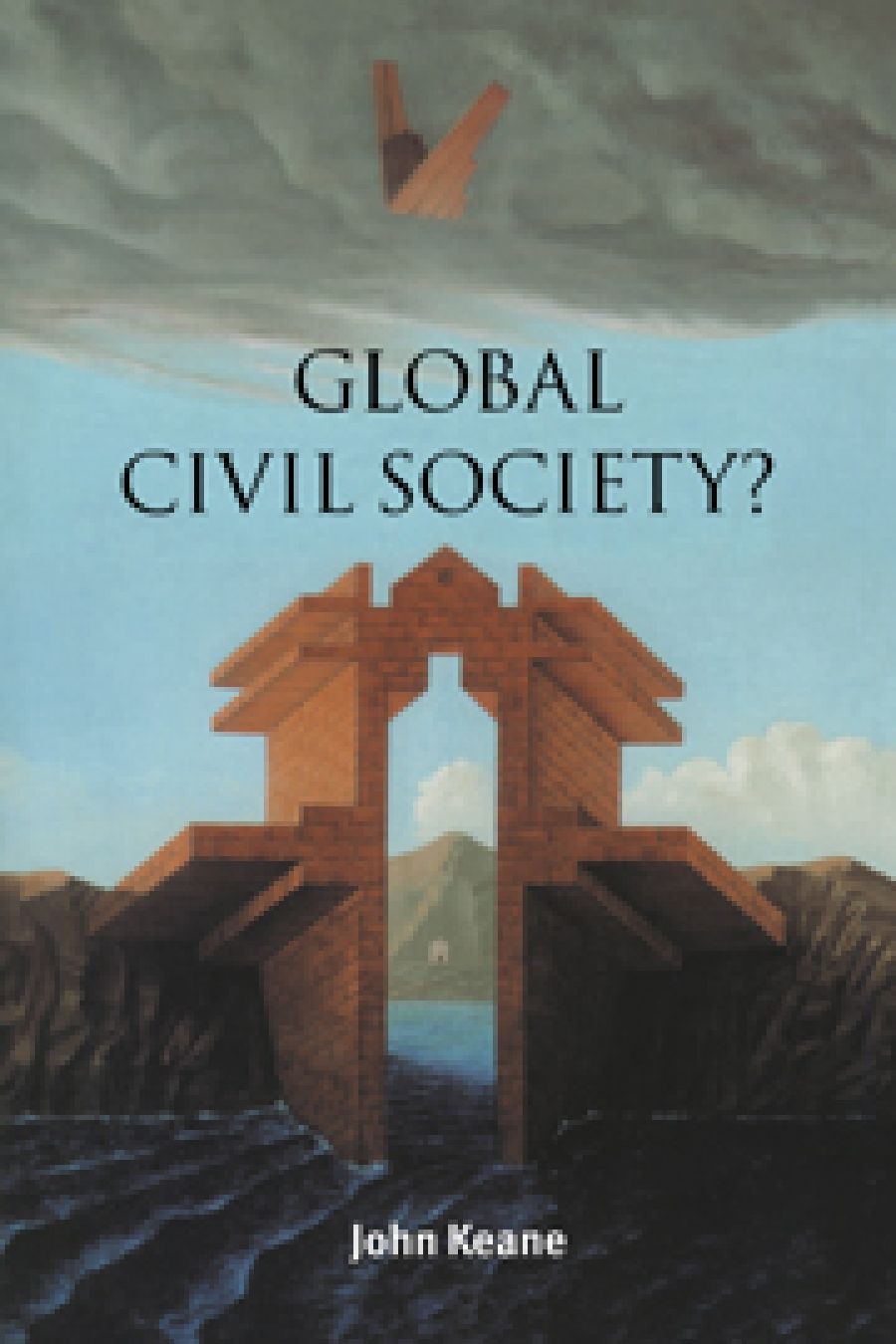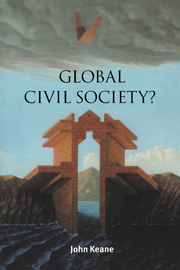
- Free Article: No
- Contents Category: Society
- Review Article: Yes
- Article Title: Two Cheers for Cosmocracy
- Online Only: No
- Custom Highlight Text:
With the world apparently going to hell in a handbasket, the flood of contributions to ideas of global governance shows no sign of abating. There is something dizzying about immersing oneself in such far-reaching and ultimately – necessarily – optimistic works about the possibility of a just global civil order at a time when the most basic liberal democratic rights and freedoms are being traded away willy-nilly at the national and local level. From national security laws to nightclub curfews, nothing seems easier to knock over than liberty, and nothing more difficult to resist than cultures of fear and repression.
Nevertheless, there is no reason not to project into a future that may offer scope for a reversal of this process. John Keane is an Adelaide-born heavy-hitter in the area of studies of civil society and democracy, and also a political biographer – most recently of Vaclav Havel. He is thus ideally placed to write a book that is both accessible to the general, well-informed reader, while sacrificing little in the way of academic smarts. He goes a long way towards succeeding, but that is in part because the political questions to which the answer is ‘global civil society’ by their very nature exclude certain dimensions of human beings whose character would complicate the picture.
- Book 1 Title: Global Civil Society?
- Book 1 Biblio: CUP, $49.95pb, 233pp
- Book 1 Cover Small (400 x 600):

- Book 1 Cover (800 x 1200):

For Keane – and he is undoubtedly right – some sort of global society with claims to a civil dimension is already here. However, it is currently in a ‘seemingly anarchic’ state, a work in progress in which markets, international bodies and cross-border, non-government organisations intersect with the old powers of bounded nation-states – the ‘Westphalia’ style states – that represent the dominant power of the old order, when territory and polity were more or less identical. For Keane, bodies like the United Nations – parliaments of Westphalia states – are part of an earlier idea of international civil order.
Global civil society occurs when different forms of power and interconnection interpenetetrate one another to such a degree that the idea of multiple frameworks of order and authority map onto each other. Keane’s term for this is ‘cosmocracy’: a global framework in which the way that people and also the political frameworks within which they live relate to each other. By its formal nature, cosmocracy is oriented towards more democratic forms of decision-making, and civility. Because people are confronted with the brute fact of each other – stripped for the most part of old ideas of racial superiority, divine right, imperial mission and so forth – a new universal ethic begins to work itself out. Or, more precisely, is open to be worked out, if we choose to commit ourselves to it as a political project.
Keane advances a number of arguments about ways in which we can approach what is already happening. The two most important are a commitment to the idea of a global ethics as dialogue – or polylogue – first and foremost; that debate on global ethics and the interaction of different ethical and cultural systems is by its nature one that cannot be concluded with a true ‘answer’. The second is that a genuinely global civil society will never be built out of cosmocracy if fatalism takes hold – if the complex form of cosmocracy leads us to believe that it has no form, nothing that can be grasped or reasoned about. In that case, victory will go to those whose interest in global life is strategic rather than ethical: transnational corporations, dictators, fundamentalist terrorist groups. Since they have a firm and clear idea of what they want they will necessarily triumph if good people do nothing.
Given this, and with the usual caveats about oversimplification of a dense, albeit very readable, work, what is one to say? Granted that Keane has touched all the bases, it nevertheless seems to me that he has not fully come to terms with the challenge of a necessary degree of incivility in the creation of a community. Take, as a highly visible example, the management of Uluru, under its traditional owners. Many people spend thousands of dollars and travel thousands of miles to see the rock, only to find that it has been closed following the death of an elder, or for other reasons. The right of the traditional owners to do this is absolutely necessary to the maintenance of its sacredness, yet it is simultaneously advertised as a tourist destination around the world. If you’d come from Germany on the basis of a brochure and all you got to see were the Olgas, you’d be mighty pissed off, and fair enough. But, in such a case, you would have to acknowledge a necessary incivility.
Ditto with a whole range of other cases from the ‘localist’ movement – the attempt to restrict imports to those goods that cannot be produced locally. And then there are all the old familiar political dilemmas such as female circumcision. I am not suggesting that these cannot be dealt with in Keane’s framework, but I wonder if it is sufficient. Are there more deep-seated human needs – for place, for abiding community – that mean that global peace and justice could only be gained by a reassertion of territoriality, against the historical process by which unconstrained media technologies and global production are dissolving it? In other words, is an acceptance of cosmocracy a form of fatalism?


Comments powered by CComment